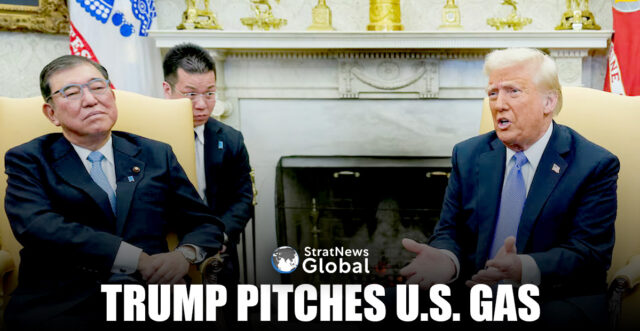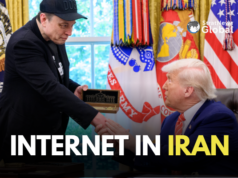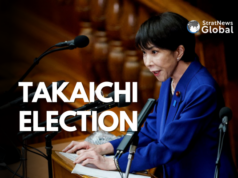During a recent lunch, President Trump and Japanese PM Shigeru Ishiba discussed Japan helping to unlock Alaska’s gas reserves for shipment to U.S. allies in Asia, aiming to replace Middle East energy and address the trade imbalance.
Ishiba – eager to ensure a positive first meeting and stave off damaging U.S. tariffs – struck an optimistic note about the Alaska LNG project despite Tokyo’s doubts about its viability.
Ishiba told Trump and his energy tsar Doug Burgum that he hoped Japan could participate in the $44 billion project, said the officials, granted anonymity due to the sensitivity of the talks.
Trump repeatedly mentioned the project in his public remarks after the lunch. Ishiba did not, and there was no reference to it in the official readout of the talks.
Increasing Gas Imports
The Trump administration is reshaping East Asia’s economic ties by promoting U.S. fossil fuel investments, especially LNG, to address concerns over tariffs and sea lane security. Despite challenges, countries like Japan, South Korea, and Taiwan are increasing U.S. gas imports, potentially boosting the U.S. economy and countering China and Russia’s influence.
Japan, as the world’s No.2 LNG buyer and key energy infrastructure investor, plays a crucial role in Trump’s strategy, helping open new markets for U.S. gas in Southeast Asia.
“If the Trump administration were to have its way, U.S. LNG would flow in massive quantities to Japan and South Korea and then would flow downstream…so that Southeast Asia would become economically dependent on the United States,” said Kenneth Weinstein, Japan chair at Hudson Institute, a conservative think tank. “It’s redrawing the map of energy dependence.”
In a joint statement with U.S. Secretary of State Marco Rubio on Saturday, Japanese and South Korean foreign ministers agreed to strengthen energy security by “unleashing” America’s “affordable and reliable energy”, particularly LNG. They did not mention Alaska.
White House National Security Spokesman Brian Hughes told Reuters the U.S. “produces some of the cleanest LNG in the world and we believe the Japanese can play an even bigger role in purchasing America’s abundant oil and gas”.
Japan’s foreign ministry declined to comment on the accounts of the Ishiba-Trump meeting. Japan’s trade minister plans to visit Washington next month to seek exemptions from Trump’s tariffs and discuss Japan’s plans to buy more U.S. LNG, Japanese media reported on Thursday.
Sales Pitch
The proposed 800-mile Alaska pipeline has struggled due to high costs and tough terrain, but Japan is preparing to offer tentative support to Trump’s project to avoid trade friction.
They did not anticipate it would feature so highly on Trump’s agenda.
During a lunch with Trump and Burgum, the U.S. urged Japan to invest in Alaska LNG infrastructure and consider long-term purchase agreements. The U.S. emphasized the project’s proximity to Japan, avoiding sensitive sea routes like the Straits of Hormuz, Malacca, and the South China Sea. U.S. Senator Dan Sullivan noted that additional LNG purchases could help Asian allies reduce reliance on Russian gas.
Alaska LNG “was a big part of the discussion” with Ishiba, Sullivan, who was briefed on the talks, told Reuters.
At one point in the meeting, the U.S. officials used maps to emphasise the strategic benefits of the Alaska project, said Sullivan and another official.
“Having a president who’s forceful and tenacious, spending this much time on this project, I’m sure made an impression on the Japanese,” Sullivan said.
Project developers are trying to court investment from firms such as Inpex, a Tokyo-listed oil and gas exploration company whose largest stakeholder is the Japanese government, according to two other sources.
A spokesperson for Inpex, which has not been previously linked to the Alaska plan, said it would not comment on “discussions or dealings with specific stakeholders”.
Japan obtains around one-tenth of its LNG from the U.S., and similar proportions from Russia and the Middle East, according to Japan’s finance ministry. Australia accounts for about 40%.
Hiroshi Hashimoto, senior analyst at the Institute of Energy Economics, Japan, stated that U.S. LNG could make up 20% of Japan’s imports within the next five to ten years as existing contracts, including those with Russia, expire. Currently, U.S. LNG is primarily shipped to Japan from the Gulf of Mexico via the Panama Canal or a longer route around Africa and through the Indian Ocean.
There are no LNG export terminals on the U.S. west coast, which offers a more direct route to Asia. However, Sempra’s Costa Azul project in Mexico, which will be fed by U.S. gas, is expected to begin commercial operations next year. In 2024, the U.S. shipped 119.8 billion cubic meters of LNG, with over a third going to Asia, according to LSEG data.
Energy Security Bonds
Trump’s energy security pitch is gaining traction across Asia, with Indian Prime Minister Narendra Modi making a similar gas pledge during a meeting with Trump. Taiwan, claimed by China, is also exploring increased U.S. energy purchases, including LNG from Alaska.
Landon Derentz, a former senior U.S. energy official, noted that increasing Taiwan’s reliance on U.S. energy could help deter China from aggressive actions, such as naval blockades.
With U.S. supplies, “in some ways you’re contracting for a security guarantee that the United States is going to be an advocate in the event of a conflict in making sure that supply arrives”, he said.
South Korea is considering investing in Alaskan LNG and other U.S. energy projects, hoping for concessions from Trump, according to two South Korean officials. A spokesperson for South Korea’s industry ministry confirmed the country’s interest in strengthening energy security with the U.S.
U.S. Senator Bill Hagerty, who previously served as ambassador to Tokyo, suggested Japan could become a key distribution hub for U.S.-origin LNG.
“Whether it’s from Alaska, Louisiana or Texas, America can work very closely with Japan to create the type of energy security bonds that will be great for our nations’ economies and for our national security,” he said.
(With inputs from Reuters)





